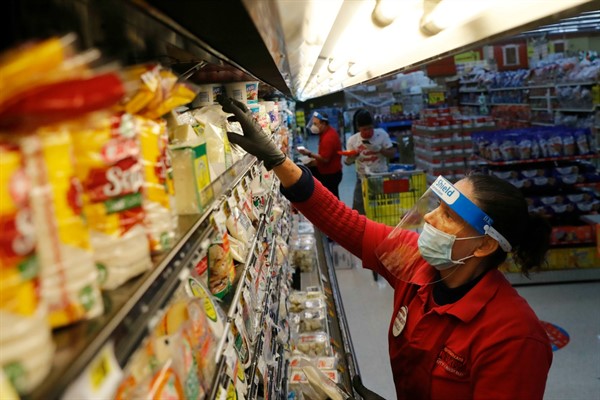One of the many challenges facing governments and businesses during a disaster is ensuring the steady supply of food and other essential items. People’s natural impulses to stock up in preparation for shortages often kick in at the same time that complex supply chains are coming under immense strain. Add to this the direct impacts of COVID-19 on workers in the food industry and the export restrictions on agricultural products that some governments have put into place to ensure that their own populations stay well-fed, and you’ve potentially got the makings of a looming food security crisis.
Robyn Metcalfe, a food historian at the University of Texas at Austin, has documented how cutting-edge technologies are altering food supply chains around the world, most recently in her book, “Food Routes: Growing Bananas in Iceland and Other Tales from the Logistics of Eating.” For this week’s interview on Trend Lines, she joins WPR’s Elliot Waldman for a conversation about how global food supply chains are adapting during the coronavirus pandemic, and how they might look very different as a result of the crisis.
If you like what you hear on Trend Lines and what you’ve read on WPR, you can sign up for our free newsletter to get our uncompromising analysis delivered straight to your inbox. The newsletter offers a free preview article every day of the week, plus three more complimentary articles in our weekly roundup every Friday. Sign up here. Then subscribe.
Listen:
Download: MP3
Subscribe: iTunes | RSS | Spotify
Relevant Articles on WPR:
What It Will Take to Save Economies From the Coronavirus Pandemic
Trump’s Trade Policies Are Making the Coronavirus Pandemic Even Worse
Why Societies Are Resilient to Disasters Like COVID-19
Building Trust, Confidence and Collective Action in the Age of COVID-19
Trend Lines is produced and edited by Peter Dörrie, a freelance journalist and analyst focusing on security and resource politics in Africa. You can follow him on Twitter at @peterdoerrie.
To send feedback or questions, email us at podcast@worldpoliticsreview.com.

